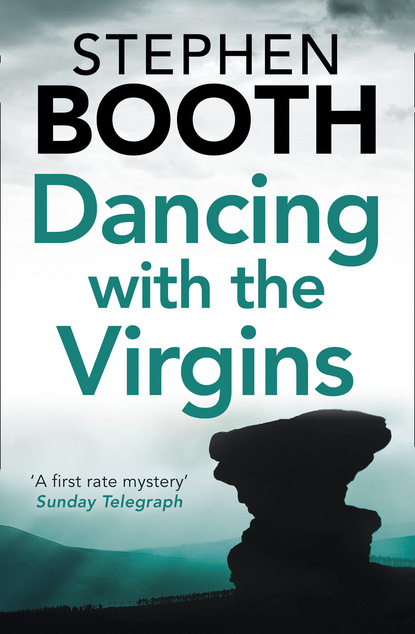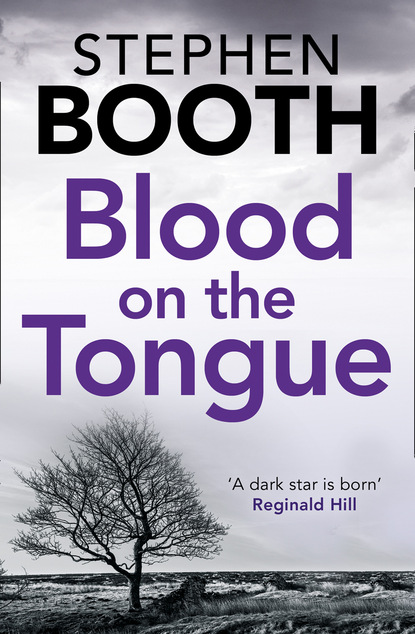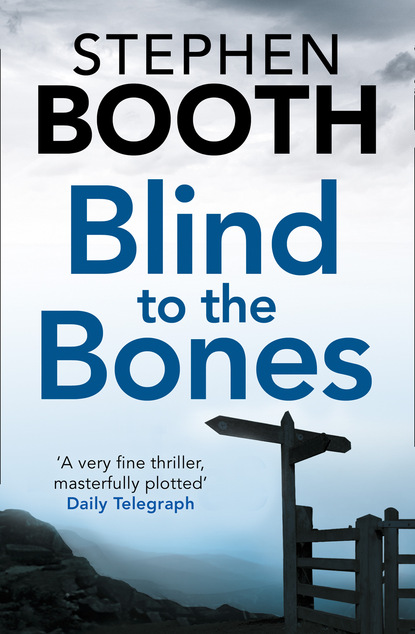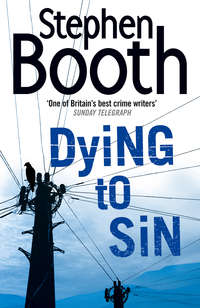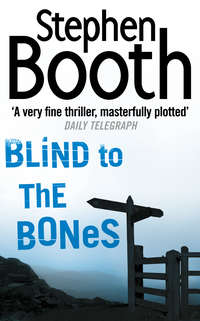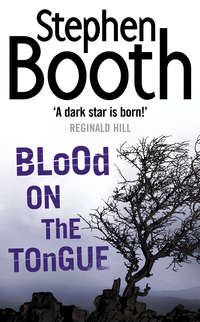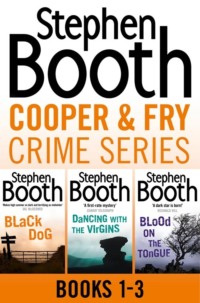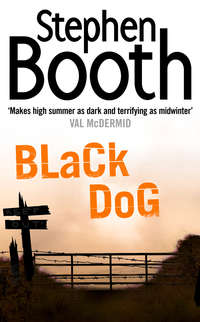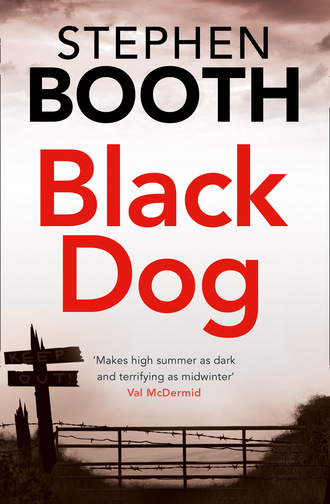
Полная версия
Black Dog
In an hour or two they would have to call off the search for Laura Vernon anyway. Even in August dusk fell eventually over the hills, and the lines of men and women would disperse and wander dispiritedly home. Tomorrow there would be appeals in the papers and on TV, and civilian volunteers would be queueing up to swell the numbers of the search parties.
Fry knew she had two choices. She either coasted along and filled in time until Rennie thought fit to allocate her some tasks; or she could speak up, take the initiative, start to show what she was made of. But she held her tongue. Now was not the time – she needed to be in a stronger position. Meanwhile, DS Rennie was not worth the effort of trying to impress.
Then the door opened and DI Hitchens put his head round. ‘Who’s here? Oh yes.’
He looked disappointed, like a captain left with the choice of the players no one wants when the teams are being chosen. Hitchens was in his shirt sleeves, with his cuffs rolled up a few inches over strong wrists covered in dark, wiry hair. He was in his thirties, and seemed to be permanently about to break into a smile. Fry caught his eye, looked from him to Rennie, who had barely moved except to shift his foot from his desk.
Hitchens nodded. ‘All right to hold the fort for a while, Dave?’
‘Sir.’
Fry jumped up eagerly. ‘Where are we going, sir? Is it the missing girl, Laura Vernon?’
‘What else? Yes, we’ve had a find called in. We’ve got a good man out in the field now checking it out, but it sounds positive. Can you be ready in two minutes?’
‘I’ll be ready.’
When the DI had left, Diane Fry went back to her desk to clear away the car crime reports. She was careful to turn her back to Dave Rennie, so that he wouldn’t see her smiling.
Edendale sat astride a wide valley in the gap between the two distinct halves of the Peak District. On one side the gentle limestone hills and wooded dales of the White Peak rolled away past Bakewell and Wyedale into B Division and the borders of Staffordshire. On the other side were the grim, bare gritstone moors of the sparsely populated Dark Peak, where the high slopes of Mam Tor and Kinder Scout guarded the remote, silent reservoirs below Snake Pass.
It was one of only two towns that sat within the boundaries of the Peak District National Park – the other being Bakewell, a few miles to the south, where one of the E Division section stations was based. Other towns, like Buxton, headquarters of B Division, had been deliberately excluded from the National Park when the boundaries were drawn.
At Buxton, as at Matlock and Ashbourne, the boundary took wide sweeps around the towns and back again. But Edendale was too deep within the hills to be excluded. It meant that the restrictive Peak Park planning regulations applied to the town as much as they did to the face of Mam Tor or to the Blue John caves of Castleton.
Diane Fry was still learning the geography of the town and the dale. So far she was familiar only with the immediate area around the Victorian house on the outskirts of Edendale where she had rented a first-floor flat, and the streets near the station – including the view of the Edendale FC stand. But she was aware that, no matter which route you chose out of Edendale, the only way was up – over the hills, to the moorland hamlets or the villages in the next valley.
Fry was a good driver, trained in the West Midlands force driving school to handle pursuit cars. But DI Hitchens chose to drive himself as they headed out of the town towards the great hump of moorland separating Edendale from the next valley.
‘It’s just the one shoe,’ said Hitchens.
‘A trainer?’ said Fry. ‘Reebok, size-five?’
The DI looked at her, surprised, raising his eyebrow.
‘You’ve been reading up on the Vernon enquiry.’
‘Yes, sir.’
‘It was always a possibility from the start that something had happened to her, though you can’t tell the parents that. She had cash with her, but had taken nothing else. We’d already traced all her friends and contacts. Negative all round. It’s inevitable, I’m afraid, that her body will turn up somewhere.’
‘What sort of girl is she?’
‘Oh, comes from a well-off family, comfortable background. Never wanted for anything, I’d say. She attends a private school called High Carrs, due to take her GCSEs next year. She gets piano lessons, has a horse that her parents bought that’s kept at some stables just outside Moorhay. She takes part in riding events sometimes.’
‘Show jumping?’
‘I suppose so.’
‘And is she good at any of those things?’
Hitchens looked at her and nodded approvingly. ‘If you believe the parents, she’s perfect at everything. Bound to get a place at Oxford or Cambridge and do her degree, but might decide to pursue a career as a concert musician later on. Unless she wins an Olympic gold medal in the meantime, of course. Her friends say different.’
‘Boys?’
‘Of course. What else? Mum and Dad deny it, though. They say she’s too busy with her studies and her horse riding, all that. But we’re tracing the boyfriends, gradually.’
‘Rows at home? Anything like that?’
‘Nothing. At least …’
‘Not according to the parents, right.’
‘Got it.’
Hitchens was smiling again. Fry liked her senior officers to smile at her, within reason. She watched his hands on the steering wheel. They were strong hands, with clean and carefully trimmed fingernails. His nose was a little too large in profile. It was what they called a Roman nose. But a man could get away with that – it gave him character. She looked again at his left hand. There was no wedding ring on his finger. But now she noticed a white scar that crawled all the way across the middle knuckles of three of his fingers.
‘The parents say that Laura had been shopping with her mother that afternoon,’ said Hitchens. ‘They’d been to the De Bradelei Centre at Belper.’
‘What’s there?’
‘Oh – clothes,’ he said vaguely.
‘Not Dad?’
‘I don’t suppose it was his sort of thing. Anyway, the females were buying him a birthday present, so he wouldn’t have been wanted, would he? He stayed at home to catch up on some work. Graham Vernon runs a financial consultancy business and says it’s going well. They do seem to be pretty well-off.’
‘And after they got home?’
‘It was about half past five by then. It was still hot, so Laura changed and went out into the garden for a while. She didn’t come back for her evening meal at half past seven. That’s when the Vernons began to panic.’
Fry admired the way he had all the details in his mind and could produce them without effort. Hitchens obviously had the sort of brain that was much valued in the police service these days. Many coppers could not have repeated the information without reading it from their notes.
‘Parents alibi each other?’
‘Yes.’
‘But she was seen talking to a young man before she disappeared, wasn’t she?’
‘Very good, Diane. Yes, we found a lady who was out collecting wild flowers on the edge of the scrubland at the top of the Baulk. She’s a WI member and is helping to create the decoration for a well dressing at Great Hucklow. She was embarrassed about admitting it, can you believe it? She thought we might arrest her for stealing wild flowers. Her children had told her it’s a crime against the environment. But the well dressing was obviously important enough to turn her to evil ways. Anyway, she came forward and identified Laura Vernon from her photograph as the girl she saw. She couldn’t describe the boy, though. Too far away.’
‘And now a trainer.’
‘Yes, that’s all we’ve got so far, but it looks hopeful. We’ve got Ben Cooper on the spot there – he was with one of the search parties. Ben’s got good judgement.’
‘I’m sure he has.’
‘Oh, you’ve met Cooper, have you? He’s only back from leave today.’
‘No, but I’ve heard the others talk about him.’
‘Right.’ Hitchens said nothing for a few minutes, negotiating a crossroads where heavy lorries thundered by at regular intervals, dusting the roadside verges with a coating of lime. Fry tried to read his thoughts, wondering if she had said something wrong. But she was sure of her ability to keep any emotion out of her voice. She had practised long and hard, and now, she felt, she only ever sounded positive.
‘How’s it going then, Diane? Settling into the CID room OK?’
‘Fine, sir. Some things are done a bit differently from what I’ve been used to, but nothing I haven’t been able to pick up on pretty quickly.’
‘That’s good. Dave Rennie treating you all right?’
‘No problem,’ said Fry. She noted that she had become ‘Diane’ since getting into the car alone with the DI. She liked to keep a track of these things, in case they had any deeper meaning. Maybe she could manage without the ‘sir’ in return, and see if it struck the right note – a closeness of colleagues rather than a senior officer with a junior. But no further.
‘Not finding Derbyshire too quiet for you after the West Midlands?’
‘It’s a nice change,’ said Fry. ‘But I’m sure E Division has its own challenges.’
Hitchens laughed. ‘The other divisions call it “E for Easy Street”.’
Fry had already been informed by her new colleagues that Edendale had been chosen over Bakewell or Matlock as E Division Headquarters for purely alphabetical reasons. It was one of the oddities of the Derbyshire Constabulary structure that the territorial divisions were all based in towns that began with the right letter – A Division in Alfreton, B Division in Buxton, C Division in Chesterfield and D Division in Derby.
So it was inconceivable that E Division should have been based in Bakewell or Matlock. It would have been an outrage against corporate neatness. In fact, if there hadn’t already been a town called Edendale, some PR person in an office at County HQ would have had to invent one.
‘But I was thinking of the social life,’ said Hitchens. ‘Edendale isn’t exactly the night spot capital of Europe. A bit tame after Birmingham, I expect.’
‘It depends what you’re looking for, I suppose.’
He turned to look towards her, his hands resting casually on the wheel. ‘And what is Diane Fry looking for exactly?’
What indeed? There was only one thing that Fry wanted to acknowledge to herself. Maybe it wasn’t what Hitchens was expecting to hear. But it was something he ought to know, now rather than later.
‘I want to advance my career,’ she said.
‘Ah.’ He raised his eyebrows, a smile lighting up his face. He was quite good-looking, and he wore no wedding ring.
‘I’m good at my job,’ she said. ‘I’ll be looking for promotion. That’s what’s important to me. At the moment.’
‘Fair enough. I like your honesty.’
The main road towards Buxton climbed and climbed until it reached a plateau where the limestone quarries competed with the moors as background scenery. There was a well-placed pub here called the Light House, with tremendous views over two neighbouring valleys and the hills beyond. Hitchens turned off the road before they reached the quarries, and they began a gentle rollercoaster ride over smaller valleys and hills, dipping gradually towards Wyedale. Farm gates flickered past occasionally, with black and white signs advertising the names of dairy herds and stacks of huge round bales of straw or black plastic-wrapped silage lying in the fields behind stone walls.
‘I’ve seen your record, of course,’ said Hitchens. ‘It’s not bad.’
Fry nodded. She knew it wasn’t bad. It was damn good. Her exam results had been in the top few per cent all along the line. Her clear-up rate since her transfer to CID had been outstanding. She had had a good career lined up in the West Midlands, and they had been grooming her for big things; anybody could see that.
‘It was a pity you had to leave your old force,’ said Hitchens.
She said nothing, waiting for the comment that she knew would have to come.
‘But it was understandable. In the circumstances.’
‘Yes, sir.’
In the circumstances. That was exactly how Fry herself tried to think of it now. ‘The circumstances’. It was a wonderfully cool and objective phrase. Circumstances were what other people had, not something that turned your life upside down, destroyed your self-esteem and threatened to ruin everything you had ever held as worthwhile. You couldn’t get upset about circumstances. You could just get on with life and concentrate on more important things. In the circumstances.
They were driving along a ridge now, with a steep drop on one side down rock-strewn slopes to a little river. Gradually the view became more and more obscured by trees. Here and there was a house set back from the road, not all of them working farms.
‘No ill effects though?’ said Hitchens.
Fry couldn’t really blame him for fishing. She had expected it sooner or later. The subject had been raised at her interview, of course, and she had answered all the carefully worded questions with the proper responses, very reasonable and unemotional. But it was bound to be in the minds of those, like DI Hitchens, that she had to rely on for her prospects of advancement. It was just another hurdle she had to get over.
‘None at all,’ she said. ‘It’s all behind me now. I don’t think about it. I just want to get on with the business in hand.’
‘One of the hazards of the job, eh? Goes with the territory?’
‘I suppose you might say that, sir.’
He nodded, satisfied. For a brief moment, Fry wondered how he would react if she did what a tight little angry knot deep inside her really wanted to do – screamed, shouted, lashed out with her fists to wipe the smug smile off his face. She was proud that she no longer did that; she had learned to keep the knot of anger tied up tight and secure.
The houses suddenly grew thicker on either side of the road, though there had been no sign to indicate they were reaching a village. There was a small school off to the right, some farm buildings converted into craft workshops and a tiny village post office and store in an end terrace cottage. The square tower of a church appeared over the rooftops, surrounded by tall, mature chestnut trees and sycamores.
They found a cluster of cars and vans parked in a gravel layby. As soon as Hitchens pulled up, a sweating PC Wragg appeared at the window of the car. He was clutching a polythene bag containing a Reebok trainer.
‘Wragg? Where’s DC Cooper?’
‘The old bloke’s showing him where he found it, sir.’
‘What’s he playing at? He should have waited,’ said Hitchens.
‘The old bloke wouldn’t wait. He said it was dominoes night, and it was now or never.’
‘Dominoes night?’
Wragg looked embarrassed. ‘He really seemed to mean it,’ he said.
The section of footpath looked much the same as any other. It had a dry bed of dusty soil, embedded with twisted tree roots that broke through the surface to form steps in the steeper places. There were oaks and birches clinging to the slopes on either side, with swathes of dense bracken clustering round their trunks. A tumble of huge rocks lay half hidden among the bracken, like the overgrown ruins of a Stone Age temple. Birds skittered away among the undergrowth, chattering their alarm calls, and there was the constant background hiss of a fast-running stream.
‘Aye, about here,’ said Harry.
‘You’re sure?’
‘I reckon.’
Ben Cooper didn’t quite know what to make of Harry Dickinson. Usually he could read some emotion in people he came into contact with in this sort of job. They were often upset, frightened, angry or even completely knocked for six by shock and distress. These were the ones for whom violent crime was something new and horrific that had never touched their lives before. Sometimes there were those who were nervous, or became unreasonably aggressive. Those were interesting reactions, too, often the first signs of guilt. He had learned to pick up those signs in the people he dealt with. He thought of it as a good detective’s instinct.
Harry Dickinson, though, had showed no emotion of any kind, not when he had been in the cottage with his wife and granddaughter, and not now when he stood with Cooper at the spot where he and his dog had found the bloodstained trainer.
During the walk down the path to the foot of Raven’s Side, Harry had marched ahead, silent and stiff, his back pulled straight, his arms swinging in a steady rhythm. He had not spoken a word since they had left the cottage, communicating only with a slight tilt of the head when they reached a turning in the path. It was as if the old man was shut up tight in a body that had turned to wood. Cooper would have liked to have got in front of him, to try to read something in the old man’s eyes.
‘You do realize that Laura Vernon might be lying nearby badly injured, Mr Dickinson?’
‘Yes.’
‘Or even dead?’
Harry met Cooper’s eyes. What was the expression that passed across them so fleetingly? Amusement? No, mockery. An impatience with such a waste of words.
‘I’m not daft. I know what’s what.’
‘It’s vital that we know the exact spot you found the trainer, Mr Dickinson.’
Harry spat into the grass, narrowed his eyes against the low sun, like an Indian picking up a trail. He pointed the peak of his cap to the right.
‘Down there? Near the stream?’
‘Jess runs down there, by the water,’ said Harry.
‘What’s past those rocks?’
‘A wild bit, all overgrown. There’s rabbits and such in there.’
‘Is that where the trainer came from?’
Harry shrugged. ‘Take a look for yourself, lad.’
Cooper walked over to the outcrop of rocks. Only their tops protruded from the grass, and their jagged shapes looked slippery and treacherous. It was not a place he would choose to walk over, given the choice of easier walking that lay in other directions. He could see that sheep must graze here, by the shortness of the coarse grass. Between the rocks, narrow tracks had been worn, and there were ancient black pellets drying on the ground.
Trying to stick to the rocks to avoid confusing any traces of footprints, Cooper clambered over into the thick undergrowth. The stream rushed over the rocks a few feet to his right, running low just here below a stretch of smooth, grassy bank. It looked like an ideal spot for two people to spend an afternoon, secluded and undisturbed.
He looked back over his shoulder. Harry Dickinson had not followed him. He stood on a flat section of rock, poised as if guarding the path, apparently oblivious to what was going on around him. His fist clenched occasionally, as if he felt that he ought to have his dog lead in his hand. He looked completely calm.
Cooper moved further into the undergrowth, his clothes brushing against the bracken and catching on the straggling tendrils of brambles. Two or three wasps, disturbed by his passage, hovered round his head, making irritating darts at his face and evading his futile slaps at the air. The trees began to close over him again, creating a dark cave filled with summer flies.
Ahead and about thirty feet below, just across the stream, he could make out a wide footpath marked with small stones and with wooden ledges built into the ground as steps. It was almost a motorway of a footpath, cleared of vegetation, well-used and worn by many feet. Cooper realized that he had almost reached the Eden Valley Trail, the path that connected to the long-distance Pennine Way a little to the north. It was a favourite with ramblers, who passed this way in their thousands in the summer.
But the spot where he stood was as remote and isolated from life on the path down there as if it had been on top of Mam Tor itself. A passing walker would not have been able to see Cooper up there among the bracken, even if he had bothered to look up.
He turned round, wafting his hand across his face against the flies. He was looking back through the trees and thick brambles as if towards the end of a dark tunnel, where the figure of Harry Dickinson stood framed in a network of grasping branches. Cooper had to squint against the contrast of a patch of dazzling light that soaked the hillside in strong colours. The old man stood in the glare of the low sun, with the hot rocks shimmering around him like a furnace. The haze of heat rising from the ground made his dark outline blur and writhe, as if he were dancing a slow shimmy. His vast shadow, flung across the rocks, seemed to wriggle and jerk as its jagged shape fragmented among the bracken and brambles.
The expression in Harry’s eyes was unreadable, his face lying partly in the shade from the peak of his cap. Cooper couldn’t even tell which way he was looking, whether he had turned away or was staring directly towards him into the trees.
He wanted to grab the old man by the shoulders and shake him. He wanted to tell him that somebody had disturbed the spot, and recently. The evidence was right there for anyone to see and to smell. There had been two people, and at least one of them had been looking for more than just rabbits. The smell that lingered under the trees was of stale blood, overripe meat and urine. And the flies had found something even more attractive than Cooper’s sweat to feed on.
5
‘OK. Secured?’
‘Officers at all points,’ said Hitchens promptly.
‘Scenes?’
‘On their way.’
Diane Fry stood behind DI Hitchens and Detective Chief Inspector Tailby, twenty feet from where the body of the girl lay. The scene had already been well-organized. Hitchens had made a big performance of it, posting officers along the track, calling for information so that he could pass it on to the DCI. But it had seemed to Fry that everything necessary had already been done even before Hitchens had arrived.
‘Scientific support?’
‘Ditto.’
‘Incident room?’
‘DI Baxter is i/c.’
Tailby was head and shoulders taller than the inspector, slim and slightly stooped around the shoulders, as very tall men often were. His hair was greying at the front but still dark at the back, and it was left to grow thicker than the cropped heads favoured by most of his junior colleagues. He was wearing green wellingtons, which were not ideal footwear for stumbling over half a mile of rough ground scattered with rabbit holes and hidden stones. He was lucky to have reached the scene without a broken ankle. Fry congratulated herself on her habit of wearing strong, flat-soled shoes and trousers.
‘Photographer?’ said Tailby.
‘Here, ready.’
‘Let him get on with it.’
Fry waited for the DCI to ask about the doctor, but she looked up and realized that he could already see Dr Inglefield making his way down the path.
‘Finder?’ said Tailby.
‘Back at the cottage, sir. With DC Cooper.’
‘Let’s see what the doc says then.’
The doctor was giving his name to a PC standing halfway up the path. Tailby waited impatiently while they compared watches to agree the time, and the PC wrote it down in his notebook. Most of the other officers who had inevitably begun to gather round the scene had been sent away to continue their search, grumbling all the more at the futility of it.
Blue and white tape hung in strands for several yards around the body, wound round the trunks of trees and a jutting stump of black rock. From where the detectives stood, all that could be seen of Laura Vernon was a lower leg. The black fabric of her jeans contrasted with the glare of a white, naked foot, its toenails painted blood-red. The rest of the body was hidden in a dense clump of bracken, and around it there were numerous signs of trampling. Fry knew that the broken stems and crushed grass raised the odds in favour of the crime scene examiners producing the sort of evidence that would lead to a quick arrest. She longed to get nearer, to get a close look at the body, to see the girl’s face. How had she died? Had she been strangled or battered, or what? Nobody was saying. At this stage, nobody wanted to commit themselves. They simply stood and watched the doctor do his official business as he nodded at the policemen without a word and made his way gingerly along a marked-out strip of ground to the crushed bracken.




